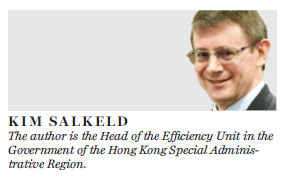The smartest way to address poverty and underprivilege
Updated: 2015-09-14 07:55
By Kim Salkeld(China Daily)
|
|||||||||
Businesses that make productive investments and create well-paid jobs are the major engine for reducing poverty and spreading opportunities across society. In addition to their effect on the economy, many businesses have set up philanthropic foundations to direct money to benevolent purposes. Many, as a matter of policy, encourage staff to lend their skills and time to help the disadvantaged. They either do this directly or through giving help to other organizations that serve people in need. Many individual businessmen are generous with their donations of money and time in helping others. Most understand that "taxes are the dues we pay for the privileges of living in society". They realize their businesses also benefit in many ways from public programs of education, housing, healthcare and other services that tackle poverty and disadvantage.
Charitable donations, voluntary work and taxation to support community-wide social services will continue as long as society itself. So, too, will innovation, and it is in this field that there is vast scope to create competitive advantage for businesses and greater value for society.
Innovations in production, packaging and distribution methods that cut pollution and waste can reduce costs directly to companies. In cutting the costs of pollution control, waste management and healthcare for society, they increase the potential of the community. Innovations that create new businesses based on the special skills, networks and experience of people who have been marginalized add to the overall scale of the economy, as well as meeting the needs of these individuals. Working practices that respect employees as human beings, members of families and citizens in society - rather than treating them only as factors of production - can invigorate the performance of companies. Such working practices also build the strength of social connections and discourse needed for cities and countries to successfully manage all the changes time thrusts on us.
In Hong Kong, there is a rising tide of entrepreneurial activity around creating new businesses that achieve social good through their business models. The unique skills of the blind and deaf have been drawn on to create new businesses in dining, tourism, entertainment and organizational learning. A new service is helping bridge the gap between owners of property bought for investment and single parents who need decent accommodation but cannot individually afford the rents. High technology is being matched with the dexterity of recent immigrants to create new businesses and services in the clothing industry. Many of us in public service and in the business community have a goal - to expand this circle of innovation from new startups to every business in Hong Kong, and build beyond a sense of social responsibility to the ability to serve society better through business. As part of this drive, a shared value initiative was launched at a forum in September.
It is natural for business to be interested in competitive opportunity. For public services, the interest in business becoming more engaged with addressing social needs has two main concerns - efficiency and learning.
On the efficiency side, simply put, the more business is doing directly to reduce harms and increase the number of people who are able to make their own way in the community, the fewer resources need to be drawn out of business and the community to redress harms and run social services. Faced with a rapid shift toward a much older population, with all that this entails for increased demand for services and reduced productive capacity, efficiency gains are essential if a city like Hong Kong is to continue to provide a good home for families and businesses in the years ahead.
Even more important than efficiency is learning. Staying with the example of aging, the new generations of older people are not only more numerous, they are better educated, more connected through technology, less supported by extended family networks. Learning how to create patterns of care and support that work well for them and for the rest of the community needs innovation and experiment. This comes easier to entrepreneurs and businesses than to the necessarily conservative processes of public service. But, by allowing and observing the innovations that business can make, and helping to promote constructive discussion around the displacements that innovation brings, public services can adapt and improve their performance. They can also sustain the interplay of contending ideas which are the enduring fount of prosperity for any community.

(China Daily 09/14/2015 page9)